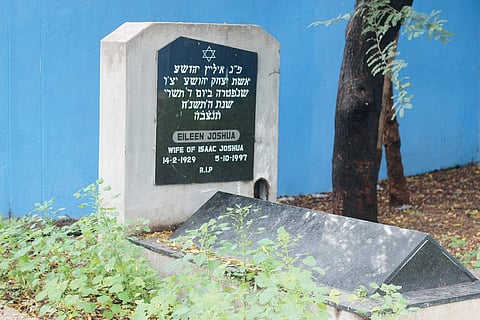

CHENNAI: Madras has been a city which has had the influence of different people and cultures. One such group of people who stayed and left a mark were the Jews and an 18th Century Jewish cemetery stands testimony to their past in Madras. Located off Lloyd’s road, the memorial is tucked amid the innumerable shops in the market area and hasn’t had a visitor for a year, reveals its care taker Kumari.
As we enter the cemetery which recently got a facelift, we notice that the walls have been painted blue; raised to avoid trespassers and the doors have been changed to sturdier ones as opposed to the rusted doors that the cemetery used to house. “In 2012 during a cyclone the wall collapsed and it has finally been raised,” says Kumari who has been the caretaker for the past 30 years. Earlier it was Kumari’s mother who used to take care of the cemetery before passing the responsibility to her. “My mother used to clean the place for Peria Aiya whenever he visited. I have always been attached to the place,” says Kumari as she tries to recollect the name of the cemetery’s first ‘Madras Jew’ caretaker. “Most people are afraid to enter the place as it’s a cemetery. But, I spend time here from dawn till dusk,” she smiles as she beings to sweep the cemetery covered with tall grass. “Maintaining the place is a task as the grass keeps growing. I pluck it out once a month,” she says and settles to chat with us.
Talking about the renovation work, she says, “All of the work took place within three months and it has been great for the cemetery in terms of avoiding trespassers and dog menace. Most people who come from the other cemetery used this way as a short-cut to go in and out,” says Kumari pointing to the Chinese cemetery situated adjacent to this cemetery.
The Jewish settlement in Madras was first established to export and import diamonds from Golconda to London in exchange of silver, coral and pearls from the fellow Jews. By the 18th Century the trade died out and the last Jew merchant departed in 1786. “The graves in the cemetery were located in the Northern end of Mint Street and then moved to Kasimedu,” says Kumari. The cemetery was located along with a synagogue which does not exist today. In 1983, the tombs in the cemetery were shifted to its current location and the last burial was that of Eileen Josua, Wife of Isaac Josua, in 1997. “I have seen that Amma, but I was too young and my mother used to be the main caretaker then,” recalls Kumari. The cemetery today, houses less than 10 tombs out of which the oldest tombstones are that of Isaac Abendo Sardo, Madras Hebrew Merchant (1709), Abraham Salomon (1745) and Salomon Franco (1763). The almost eroded engravings in the tombstone remain as documents to the history of these merchants who did trade in the city before the Chettiars, who were also associated with trade of gems and pearls. “These tombs are very old and it takes a great deal to protect and preserve them. Sir has done a lot in preserving it,” she says mentioning its previous Jew caretaker, who requests anonymity. “I have spent a lot in taking care of the cemetery and saving it from illegal activities. Its current caretaker is now travelling,” he says, who is one of the last remaining Jews in the city.
Though the cemetery has been revamped to preserve the legacy of the Jews, it remains empty until a rare visitor decides to pay their respects to the buried men and women. “We haven’t had a visitor in the last year. Before that we had lots of foreigners and people from the city visited it. Sir used to call me and inform prior to their visit and I used to keep the place clean for them. Now, no one seems to visit. Most don’t even know that the place exists,” shares Kumari.
As we conclude, Kumari sweeps the cemetery, locks the double doors and says, “I am specific that no one enters this cemetery without permission.
Without my notice no one enters and these people resting here deserve respect,” she adds